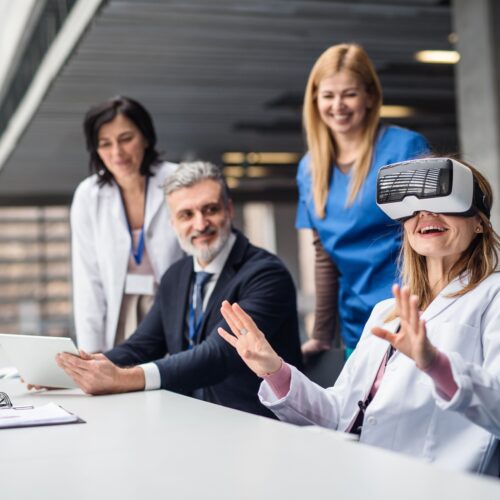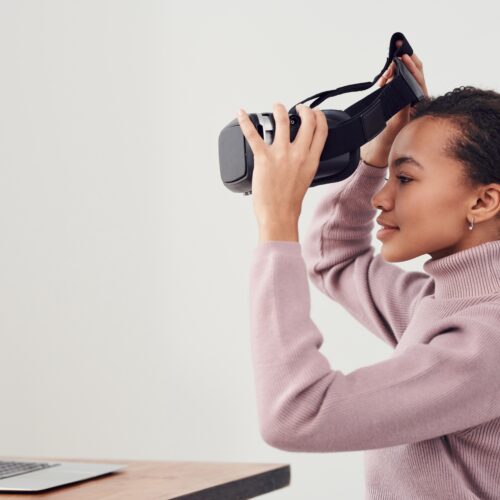What will be the main innovations that will revolutionize medicine in the 2020s?
According to TIME, the next decade will bring changes that will revolutionize the field of health care and medicine.The list (admittedly not exhaustive) written by the renowned magazine includes innovations like a mind-reading wristband, virtual reality used in rehabilitation, and artificial intelligence for cancer diagnosis, among others.David Abney: drone-delivered of medical suppliesSince March, drugs, blood samples and tissues have been delivered by a new courier. Although not the only one to offer this service, UPS has been conducting a test called Flight Forward that involves using drones to deliver medical supplies between hospitals. Whilst the service could perhaps be quicker, it works well and will be extended to serve more hospitals.Christine Lemke: an even bigger Big DataTens of millions of us track health with wearables devices like smartwatches or blood-pressure monitors. What would happen if all this information were accessible as well as completely anonymous and used for drug development? Evidation, a California-based Big Data company, is already on board and has conducted dozens of studies thanks to these new opportunities.Doug Melton: a solution for diabetesDoug Melton, the father of Emma and Sam, both diabetics, founded Semma Therapeutics to develop a technology that allows stem cells to be used to create replacement beta cells that produce insulin. If successful, Doug will be able to restore a normal way of life to those who suffer from diabetes, thanks to the implementation of a very small device.Abasi Ene-Obong: a more diversified genome bankPeople of Caucasian descent make up about 80% of the subjects involved in human genome research. The Nigerian startup 54gene, founded by Abasi Ene-Obong, aims to diversify this genetic material to allow drug development and research to use more diversified data.Sean Parker: removing cancer research barriersThe Parker Institute for Cancer Immunotherapy created by Sean Parker is the network formed by several prominent institutions and has one aim: to eliminate obstacles to innovation in traditional research. Since 2016, the year of its establishment, the institute has brought 11 projects to clinical trials and supported around 2000 research reports.Thomas Readon: a mind-readingwristbandThomas Readon, CEO and co-founder of CTRL-Labs, has created a technology that through the use of a wristband device (CTRL-Kit) detects the electrical impulses that travel from the neurons, reach the muscles of the arm and even the hand as if the subject were themselves dictating the movement. This innovation could facilitate new rehabilitative methodologies for patients with Parkinson’s, multiple sclerosis and other neurodegenerative conditions.Jonathan Rothberg: pocket ultrasoundIs there a way to make scanning more accessible? Yes, according to Jonathan Rothberg, thanks to Butterfly IQ which offers a go-anywhere device that facilitates access to medical imaging through the use of an iPhone app. And at a cost of 50 times less than the machines used in hospitals.Shravya Shetty: cancer-diagnosing artificial intelligenceSharavya Shetty, a Google Health researcher, found that artificial intelligence outperforms radiologists in diagnosing lung cancer. The preliminary results are promising; if her project progresses as is anticipated, it would open the door to early diagnosis, before the onset of symptoms that usually don’t appear until later stages, by which point treatment becomes difficult.Joanna Shields: AI to read scientific reportsIt would be impossible for any scientist to be updated with all the research papers published every year (more than two million). BenevolentAI wants to help professionals, which is why it has created algorithms that run through research papers, clinical test results, and other sources in search of the previously overlooked relationships between genes, drugs, and pathologies.Sean Slovenski: “Walmart-ification” of health careWalmart opened its first medical mall where customers can get primary care, vision and dental exams, X-rays, EKGs, and even sports and nutrition classes – with insurance not a requirement.Charles Taylor: 3-D digital heartsThe diagnoses required for those who suffer from heart problems are usually very invasive. HeartFlow has been designed to both address this issue and to improve the results of treatments. Charles Taylor’s method consists of creating custom 3D models and, in some cases, they manage to avoid invasive procedures entirely.Isabel Van de Keere: virtual reality in rehabFollowing an accident, Isabel Van de Keere had to undergo three years of intense neurological rehabilitation, with progress so slow that it bordered on indetectable. With Immersive Rehab, she aims to change the future of rehabilitation using Virtual Reality. VR creates more opportunities to harness the brain’s plasticity and repair neural pathways, increases the amount of information that therapists can use to measure progress and improves the monotony and frustration of rehabilitative therapy.





